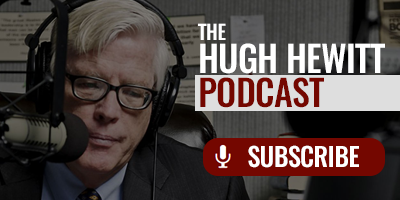Taiwan Foreign Minister Joseph Wu on Taiwan’s Coronavirus Response and Whether We Could Emulate It Here

The audio:
The transcript:
HH: Dr. Joseph Wu, America, I’m Hugh Hewitt, Dr. Joseph Wu is Foreign Minister of Taiwan, the country that has done the best job with Coronavirus as far as I can tell. Minister Wu, welcome to the Hugh Hewitt Show.
JW: Well, thank you very much for inviting me, Hugh. I’m very glad to be able to be on the show.
HH: Well, I’m very happy to have you, because you are a Buckeye. You’re an Ohio State University PhD. Urban Meyer listens to the program, so go Bucks and go Taiwan.
JW: Thank you very much.
HH: Minister, Minister Wu, how come Taiwan has done so much better than any other country? 50 cases, I think one confirmed death as of Friday, what did you do that the rest of the world needs to copy vis-à-vis the virus?
JW: Even though we are quite successful so far, but our doctors or experts, our CDC officials feel very cautious at this moment. We are receiving more import cases these couple of days. As we see it, we survived the first wave, the wave of origin from China, and then later by Korea, which is, you know, Asian countries. Now, we are facing the second wave, which is the wave coming from Europe. Even though we are doing there well, but there’s still cases coming in. And we know that there will be more coming over to this part of the world, which might be the United States. We will characterize it as a third wave. And we have to be very careful every minute in order to stay successful. And you asked about why or how we do better than other countries. I can tell you that we learned it from our experience. Taiwan was hit very hard by SARS back in 2002 and 2003. And we learned the lesson, and therefore, we try to structure the government to deal with an epidemic like this. So when we heard that there was some suspicious cases in Wuhan, China, we jumped up ahead of what may happen to us. We started our command center. We started our taskforce in dealing with the situation. And when the situation is getting worse in China, we mobilized the whole government to deal with the situation. We try to control the border. We tried to set up quarantine mechanisms, and we tried to set up tracing mechanisms to deal with those cases, including the contacts. And the government is also issuing public messaging policies. And we also set up ration mechanisms for materials for us to face the situation. So this is what we do altogether, and so far, it’s been successful.
HH: Now do you believe that the best practices that Taiwan has adopted are applicable, and indeed possible to replicate in the United States?
JW: Of course. If you look at the CDC officials in Taiwan, actually they are being trained by the U.S. CDC officials. So what we have been doing are actually taught by the U.S. CDC officials. So if the United States decided early, I’m sure the United States will be able to deal with the situation like the way Taiwan is dealing with it. But I think if you look at the U.S. situation right now, it might be a little too late as we see that New York, Washington State and also California, they already have a widespread community spread. And the situation can only be contained if we try to eliminate the community spread rather then do it the way Taiwan is doing. You know, we do it from zero. But the United States has to face the situation from a situation that there’s already community spread. But of course, we need to work together with the United States at this moment or in the future. If we are going to fight the epidemic. I think there has to be a global effort, and Taiwan is ready to work with the United States.
HH: Now Minister Wu, they had community spread on the Mainland. And drastic measures were adopted. Do you think those measures are what every country, whether it’s Italy, Germany, the United States, or countries which will eventually be hit should adopt the same sort of draconian measures that were adopted on the Mainland?
JW: I don’t think so. China is an authoritarian country. And it’s adopting those measures in violation, in gross violation of human rights. And that is not the way to do it. I think there can be a more humane way of dealing with this situation as fellow democracies facing the same situation. I think we can find better ways in dealing with this rather than the way China is dealing with it.
HH: I’d like to ask you about the PRC if I can, Minister Wu. There is an effort by some in the PRC to imply that the U.S. military created the virus. There is an attempt by some to suggest it was not first found in Wuhan. What do you make of those claims? Why are they making those claims?
JW: Well, you know, when the Coronavirus started in Wuhan, we sent our CDC officials and experts to that area to make investigation. And we knew that there was something wrong in that place. But the Chinese government officials were rather quiet about the real situation. And I think right now, the world already knows where that it started, and that is the term that we use to describe this kind of Coronavirus. We called it Wuhan Pneumonia Coronavirus, and I think that’s the way the U.S. is calling it right now. But the Chinese understand that its national reputation suffered tremendously in the last few months because of the Coronavirus. And what it’s trying to do is trying to overturn that kind of situation. Rather than blaming the United States or blaming American soldiers of carrying the virus into the Wuhan area, I think the Chinese are also coming out in a very strong way through its propaganda that it is the savior of the world right now. It can provide relief material, it can provide protection to the countries that are infected by the Coronavirus. So this is the situation like trying to turn black into white. And that is something that I’m sure the United States will find unacceptable. And that is something we try to ignore, whatever comes out of China. We in Taiwan need to focus on our fight against Coronavirus.
HH: I want to come back to Taiwan’s fight in just a moment, but let me stay on General-Secretary Xi for a moment. He’s been on a losing streak. He’s mishandled relations with Taiwan, with Hong Kong. He lost a round in the trade war to Donald Trump. He’s managing an economy that is genuinely in collapse right now. Is he in trouble?
JW: That is something that we are watching very carefully. You know, the United States is half a globe away from China. And the United States has been watching China already. And we are only like 60 miles away from China. And China has been threatening Taiwan. So we have been watching very carefully on what’s happening in China. And I will agree with you that the Chinese economy has already been slowing down even before the Coronavirus hit. And there are discontent inside China where we see more and more people out of jobs. And the anger, the public anger at President Xi Jingping, who is the top leader, who is the top decision maker. And if something is going wrong in China, he’s to blame. But we have been very careful in monitoring the situation without trying to provoke China. And as you know, and our audience may know also, that the traditional wisdom of authoritarianism is that if they have something wrong domestically, the easiest way for them to find a scapegoat is to launch a war or create crisis with countries outside its border. And Taiwan can be a very convenient scapegoat. So we are sitting watchful, and we are trying to be very careful in dealing with China.
HH: Two months ago, Minister Wu, I would never have asked this question, because General-Secretary Xi was considered to be one of the most powerful and in control leaders in the world. But so was Nikita Khrushchev when he woke up one day and his politburo removed him. Is there that possibility among your Mainland experts of which you are one that the politburo there, the party simply dismisses the general-secretary?
JW: Of course, that is one of the possibilities when China goes down the road. But I always say that I made a terrible mistake in 1989 when I wrote my PhD dissertation. I thought that Soviet Union at the time was a concrete block. Nothing is going to change. But it took only a few months to prove myself wrong. So it’s going to be very hard to see what China’s going to evolve like. But I do see public discontent toward the government. Nevertheless, the government is still in very good control of the society in general at this moment. But if the economy goes down further because of the Coronavirus or other issues, I’m sure the Chinese government is going to face very serious challenges domestically.
HH: Now Minister Wu, in Taiwan, let’s turn back to the economy. The focus this week in the United States will be on fiscal on monetary stimulus. Our Federal Reserve has cut interest rates to zero. They’re doing purchase programs. There will be a fiscal stimulus out of Congress. I hope it’s devoted to Defense spending, primarily, as well as relief to the businesses affected. What has Taiwan done to keep its economy forward at full speed?
JW: In the last few years, we did a structural reform. In the previous years, Taiwan’s economy depends on reliance on China or domestic manufacturing. We know that is not enough. So in the last few years, we turned towards innovation either in high technology or in green power or in biomedical technology or even in the Defense technology. And we’ve been quite successful in the last few years. And other than that, the government is also providing infrastructure, a large batch of infrastructure construction projects in order to stimulate the economy further. And I think in the last few years, we see that Taiwan’s economy has grown steadily, and we are doing fine. But with this Coronavirus hitting Taiwan, and hitting the rest of the world very hard, I think Taiwan’s economy may be affected because of, you know, the overall economic slowdown all over the rest of the world.
HH: Last question, Minister Wu, and I appreciate your time, and I hope you’ll come back. I’m counting on American science, Israeli science, and I think Taiwan science to produce both interventions that are efficacious and eventually a vaccine that will end this problem. How is Taiwan’s medical research industry?
JW: Taiwan’s medical research capability is rather good. We are trying to develop the best test kit. We might be able to test when someone might be infected within 15 minutes. And we are also doing research together with the United States on vaccines. We are also developing medicines to treat the infected patients. And these are joined research with the United States. In just these few days, we are discussing further with the United States to see if there can be more collaboration between the two countries. In fact, we are calling for a global collaboration fighting against Coronavirus not only the vaccines or medicines. We are also calling for the international community, especially the United States at this moment to see how we can trace the infected cases and to trace those people who might have come in contact with the infected cases. And I believe it’s going to be a very effective mechanism in dealing with the situation.
HH: We look forward to that cooperation. I look forward to having you back, Minister Wu, and I’m very, very happy that the Foreign Minister of Taiwan is a Buckeye. That is very good news. Thank you for joining me.
End of interview.







 @HughHewitt
@HughHewitt





